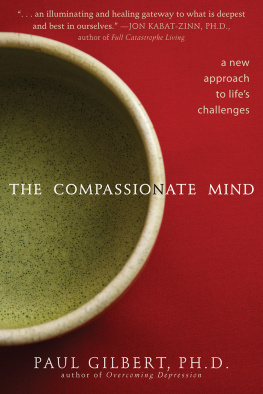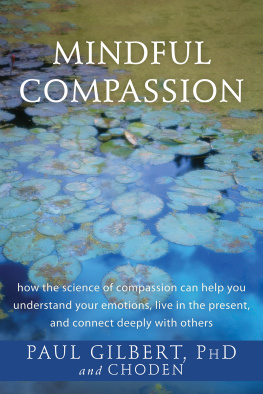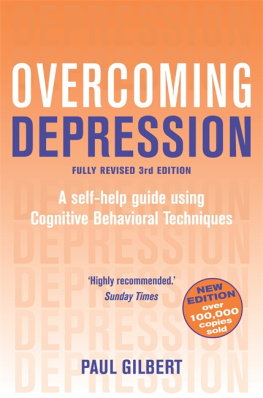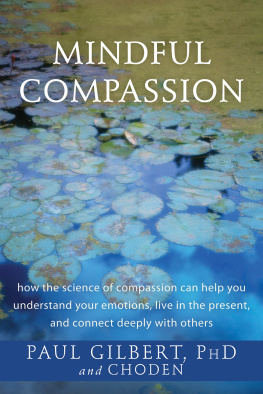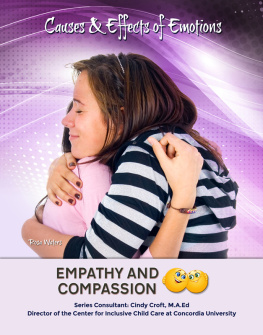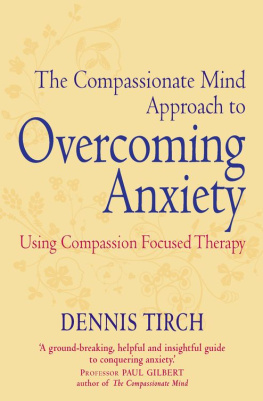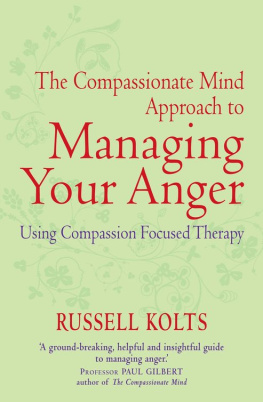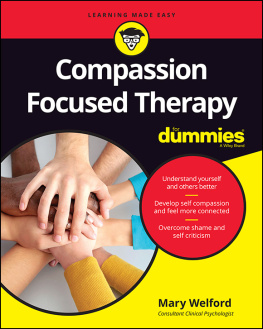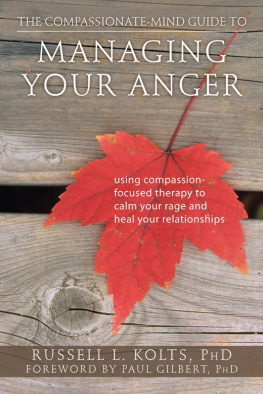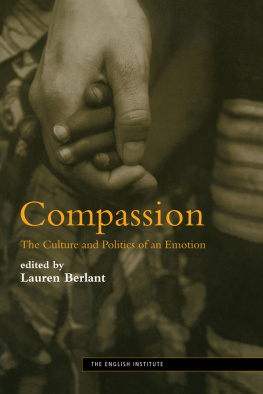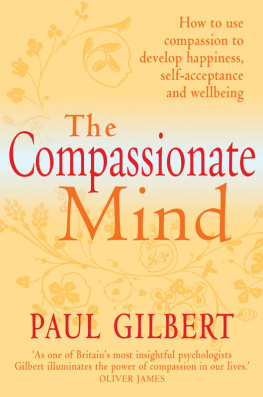
Paul Gilbert, Ph.D., is a professor at the University of Derby in the United Kingdom and director of the mental health research unit at Derbyshire Mental Health Trust. He has written over a hundred academic papers and is a fellow of the British Psychological Society.
For a long time, Paul Gilbert has been making seminal contributions to our understanding of compassion and how, if systematically cultivated, it can become a force for greater good both in our hearts and in the world. This book offers a deep and compelling evolutionary perspective on the human brain, mind, and culture. It demonstrates how much meaning and our well-being hinge on our innate capacity to extend heartfelt compassion to ourselves and to others. It also guides us in working skillfully with deeply ingrained tendencies such as anxiety, anger, and depression, so they do not dominate our lives and erode our health and happiness. Written with a deep sense of kindness towards all who suffer, including himself, this book is a very friendly, practical, and potentially illuminating and healing gateway to what is deepest and best in ourselves, often completely unknown or unrecognized by us.
Jon Kabat-Zinn, Ph.D., professor of medicine emeritus at the University of Massachusetts Medical School and author of Full Catastrophe Living and Coming to Our Senses
In this impressive volume, Paul Gilbert offers compelling insight into a key challenge of our time: compassion. The reader will find a conceptual and practical guide to cultivating a more compassionate mind. The author gracefully integrates evolutionary neuroscience, cognitive behavioral therapy, Jungian archetypes, attachment theory, Buddhist psychology, and over thirty years of clinical experience into a book you wont want to miss. Dozens of accessible exercises make this book especially helpful for readers who want to transform their lives for the better.
Christopher K. Germer, Ph.D., clinical instructor in psychology at Harvard Medical School and author of The Mindful Path to Self-Compassion
Paul Gilbert has created a masterpiece urging us to harness the power of our minds to shape our brains toward compassion and kindness. Exploring the science of our ancient neural circuitry and weaving this with our contemporary cultural pressures, The Compassionate Mind takes us on a powerful journey into the origins of the challenges that keep us from living life with meaning, connection and resilience. Once were well-prepared with this fascinating background, Gilbert shows us in useful detail the personal practices that enable us to sharpen our skills of compassion for ourselves, for others, and for the larger world in which we live. The result is not only increased happiness and better physical health, but more meaningful relationships with others, and even a better relationship to our planet. There is no better time than the present to learn these important steps to enhance our individual and collective lives, and even to transform our place in the flow of life on Earth.
Daniel J. Siegel, MD, clinical professor at the University of California, Los Angeles School of Medicine and author of Mindsight and The Mindful Brain
Anyone who struggles with their inner critic should make sure to read this book. Professor Gilbert writes in a masterly fashion about compassionate mind training, an innovative approach which is likely to grow in importance over the next decade as the evidence for its benefits continues to build.
David Veale, Institute of Psychiatry, Kings College, London
Paul Gilbert has come forth again with a book about the mind, its unused potential, and how to hardness that potential to ones and others benefit. The Compassionate Mind is a road map to compassion for the self and towards others. It is a book for those curious enough to explore their hidden potential to attain a special kind of humanness and happiness. A ten on a scale from one to ten.
Michael McGuire, author of Darwinian Psychiatry
Internationally-renowned psychologist Paul Gilbert has provided all of us with a much-needed book. Written with wisdom and warmth, Gilbert takes us on a journey through the far reaches of evolution to the very depths of our own hearts. This helpful and thoughtful guide to living a compassionate lifefor yourself and for otherswill be a reminder for many of us that we are all human but that we need to be more humane toward our own troubled selves. Throughout this book, the reader will feel like the author is speaking directly to him or her, and will recognize that it is possible to use the tools of modern psychology to fix what feels broken inside of us. A timely book for a time when competitiveness, materialism, and narcissism have failed us. This book provides timeless wisdom that you can use every day. It will make a wonderful gift for someone you care for, especially if you give it to yourself.
Robert L. Leahy, author of The Worry Cure and president of the International Association for Cognitive Psychotherapy
Paul Gilbert is one of the most brilliant scientists studying compassion today. In this wonderful book, he makes his theories very accessible and down-to-earth. You feel like youre having a chat in his living room with a warm cup of tea. I also love his easy-to-follow exercises, which offer concrete ways to help you develop greater compassion in daily life.
Kristin Neff, associate professor of human development at the University of Texas at Austin
The increasing drive to find a competitive edge in all aspects of our lives may create efficiencies, but they are cold, heartless, and unpleasant to live with. Gilbert shows how and why this occurs, and explains why our capacity for compassion is the antidote.
Oliver James, author of Affluenza and The Selfish Capitalist

Publishers Note
This publication is designed to provide accurate and authoritative information in regard to the subject matter covered. It is sold with the understanding that the publisher is not engaged in rendering psychological, financial, legal, or other professional services. If expert assistance or counseling is needed, the services of a competent professional should be sought.
Distributed in Canada by Raincoast Books
Copyright 2009 by Paul Gilbert
New Harbinger Publications, Inc.
5674 Shattuck Avenue
Oakland, CA 94609
www.newharbinger.com
First published in the UK by Constable, an imprint of Constable & Robinson Ltd, 2009
Cover design by Amy Shoup
All Rights Reserved
Epub ISBN: 9781608828500
Contents
Acknowledgements
Im delighted to thank many people for all their contributions to this book. I must begin with the many patients whom Ive seen in psychotherapy over the past 30 years for their courage and insights into the difficulty they have in being compassionate to themselves and their efforts to become so. It was with them that the central idea that a lack of self-kindness and warmth is central to the many states of mental suffering took root.
We have sought to research this in some detail in particular, with regard to issues linked to shame and self-criticism. Here I would like to thank my research colleague Chris Irons who, over many years, worked on various models of compassion with me. Im also delighted to thank enthusiastically my current, wonderful research team of research coordinator Corrine Gale and researcher and data analyser Kirsten McEwan. They work fantastically hard and with dedication. Special thanks, too, go to Helen Rockliffe for her enthusiasm and hard work while with us. My secretaries Diane Woollands over many years (now retired sorry if I wore you out) and recently Sue Branningan and Lesley Fulter offered excellent support with proof-reading and reference checking. Special thanks also go to Keith Wilshere for his masterly management of our research unit, for keeping us all afloat and getting me back into guitar playing and recording with Still Minds.

